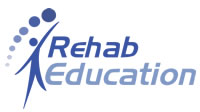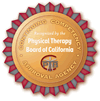Shoulder Dysfunction: A Practical Approach to Examination and Treatment
Working with clients that have shoulder dysfunction can be challenging. This course provides a practical evidence-informed pathway that uses special testing for the purpose of guiding treatment decisions. Included are the concepts of assessing and treating motion deficits based on scapular and glenohumeral motor control, soft tissue restrictions, neural mobility restrictions, and thoracic spine stiffness.
This hybrid course includes independent study components (recorded lectures and demonstrations) which are completed prior to the on-site training, allowing the in-person sessions to be heavily lab-based.
Covered motion-based interventions consist of:
- taping
- neural mobilization
- instrument assisted soft tissue mobilization (IASTM)
- negative pressure soft tissue mobilization (NPSTM) or cupping
- corrective exercises
Please dress to allow access to your entire upper quarter to enhance the learning process.
Pre-Requisite:
Exposure to IASTM in the clinic or through an introductory course is recommended.
Requirements:
You will be required to:
- wear a halter top or tank top for lab sessions.
- wear comfortable clothing over lab attire, so you are not cold during lecture sessions.
- Bring a yoga mat for your personal use during lab sessions.
Accessing Pre-Course:
Upon completion of online registration, you will be emailed a course receipt. This is NOT a course confirmation. Once the required minimum number of participants have registered, you will receive an email confirmation along with details on how to access your online independent-study Pre-Course .
It is recommended that you wait for written course confirmation prior to booking non-refundable travel or lodging. If you have not received course confirmation 14 days prior to your start date of your live session, please contact Rehab Education, LLC to check on status of your registration.
SELF STUDY PRE-COURSE: These recordings must be viewed prior to attending the live, in-person portion of the course.
Introduction power point
- Shoulder anatomy and biomechanics
- Concavity compression
- Total Arc of motion
- Scapular kinematics
- Movement dysfunction (possible sources of motion loss)
- Joint components
- Motor deficits
- Neural mobility deficits
- Screening Techniques
- Rotator Cuff Competency
- Total Arc of Motion
- Scapular motion
- Neural Mobility
By the end of this course, participants will:
- Implement screening techniques to significantly increase examination efficiency
- Incorporate deficit-specific interventions to target motion dysfunction identified during examination
- Develop robust multi-faceted treatment programs for shoulder dysfunction that are motion-based
- Apply and document findings for neural mobility testing of the UE using the neural mobility grading scale (0-5/5) for biasing the brachial plexus
- Identify neural-based motion restriction via mobility testing and palpation
- Integrate NPSTM, IASTM, and taping treatments to enhance outcomes and carry-over
This course consists of an online component and a live component. The online component is a 2-hour independent study pre-course consisting of recorded presentation of key concepts; this must be completed prior to attending the live component. The live component consists of 10 hours of live classroom presentation and lab sessions.
INDEPENDENT-STUDY PRE-COURSE: These recordings must be viewed prior to attending the live, in-person portion of the course. (Values are in hourly increments)
2.0 hours
- Introduction
- Shoulder anatomy and biomechanics
- Concavity compression
- Total Arc of motion
- Scapular kinematics
- Movement dysfunction (possible sources of motion loss)
- Joint components
- Motor deficits
- Neural mobility deficits
- Screening Techniques
- Rotator Cuff Competency
- Total Arc of Motion
- Scapular motion
- Neural Mobility
LIVE IN-PERSON, HANDS-ON COURSE: (All recordings must be viewed prior to start of this portion of the course)
0.5 Recap of pre-course
SCREENING TECHNIQUES LAB
0.33 Active movement Screen
0.33 Rotator Cuff Competency Screen
0.33 Total Arc of Motion Screen
0.25 Scapula Screen
0.75 Neural Mobility Screen
INTERVENTIONS
Advanced Manual Interventions
1.75 Taping
- Rotator Cuff stabilization kinesiology tape
- Scapular stabilization non-elastic taping
- Brachial plexus median nerve bias
- Lift at pectoralis minor
- Lift at pronator teres
- Brachial plexus radial nerve bias
- Lift at Arcade of Frohse
1.0 NPSTM
- Shoulder
- Infraspinatus
- Lower Trapezius
- Rhomboids
- Serratus anterior
- Brachial plexus
- Cords
- Trunks
- Deltopectoral & coracopectoral interval
1.5 IASTM
- Shoulder
- Superficial
- Deep
- Brachial plexus
- Scalenes
- Subclavius
- Pectoralis minor
- Deltopectoral & coracopectoral interval
- Neural Mobility
- Pin/Stretch along course
- Scalenes
- Pectoralis minor
- Deltopectoral & coracopectoral interval
Exercise-based (mostly) Interventions
- Concavity Compression
- IR/ER Sinusoidal
- ER Side hop
- Scapular Stability
- TB T’s and diagonals + integration of cervical stabilization
- Kettle Bell arm bar protractions, crosses, circles
- Farmer’s Carry
- Bell up carries, 3 position
- Blackburn’s
- Modified Blackburn’s on Stability ball
- Y T I & Press
0.5 Scapular Dyskinesia
- Scapular Clocks
- Brügger’s
- Mirror SICK Scapula open and closed chain exercises
- 3 m.o. press ups
0.5 Restoring Total Arc Rotation Motion (TARM)
- Pin/Stretch
- Mobilization With Movement Internal Rotation
- Sleeper Stretch and Genie Stretches
- Self-release with LAX ball
0.5 Thoracic Mobility
- Foam rolling
- ACJ / SCJ Mobs
- Mid-back extension mobs
- Upper thoracic extension mobs
Bonus videos of the exercises above will be provided to attendees for post course study
CEU’s: 10 direct contact hours+ 2 independent study contact hours= 12 total
*Includes self-study component
Appropriate lunch and study breaks will be in addition to total hours.
12 Contact Hours (12 clock hours)
CEU’s: 10 direct contact hours+ 2 independent study contact hours= 12 total
This course content is not intended for use by any participants outside the scope of their license or regulation.
This live interactive webinar course is accepted by many professional credentialing organizations and state professional regulatory boards. Rules and regulations change frequently without notification, and apply differently to live and online courses. Please check with your state board to confirm accuracy of this list and acceptance of contact hours. Certificate of Attendance will be issued to all participants upon completion of the course and may be used for CEU verification of credits.
CE credits vary by state. Please check with your state board/certifying agency to confirm conversion of contact hours to CEUs.
Rehab Education, LLC is recognized as:
- AOTA approved provider of OT and OTA continuing education (#6177)
- approved provider of PT and PTA continuing education by the NY State Education Department Board of Physical Therapy.
- approved provider of PT and PTA continuing education by IDFPR/ Illinois Board of Physical Therapy (#216000227).
 American Occupational Therapy Association (AOTA): Rehab Education, LLC is an AOTA Approved Provider of professional development. Provider # 6177. This live in-person CE course with online self-study pre-requisite activity is offered at 1.2 CEUs (12 hours) | Intermediate level | OT Service Delivery/Foundational Knowledge. PD Approval ID# 07902. AOTA does not endorse specific course content, products, or clinical procedures. (Course must be completed prior to 9/27/2028)
American Occupational Therapy Association (AOTA): Rehab Education, LLC is an AOTA Approved Provider of professional development. Provider # 6177. This live in-person CE course with online self-study pre-requisite activity is offered at 1.2 CEUs (12 hours) | Intermediate level | OT Service Delivery/Foundational Knowledge. PD Approval ID# 07902. AOTA does not endorse specific course content, products, or clinical procedures. (Course must be completed prior to 9/27/2028)
Arkansas Physical Therapy Association: This course has been approved by the Arkansas APTA for 12 contact hours. Approval #APTA-AR 2018
California OT Board: This course and instructor have been approved by the CA Board of OT for 12 contact hours of post-professional education in the advanced practice area of hand therapy. Approval #22-H31.
 CA Board of Physical Therapy: The Physical Therapy Board of California recognizes Rehab Education, LLC as an approval agency to approve providers offering continuing competency courses for CA licensed PTs and PTAs. This course is approved for 12 contact hours.
CA Board of Physical Therapy: The Physical Therapy Board of California recognizes Rehab Education, LLC as an approval agency to approve providers offering continuing competency courses for CA licensed PTs and PTAs. This course is approved for 12 contact hours.
Illinois State Board of Physical Therapy: Approved CE Sponsor by Illinois State Board of Physical Therapy, Division of Professional Regulations, Approval #216.000227. (Course must be taken prior to 09-30-2024)
New Jersey State Board of Physical Therapy Examiners: This course has been approved by the New Jersey State Board of Physical Therapy Examiners for 12 continuing education credits, Approval #2308-59. (Course must be taken prior to 01-31-2026)
NY State Physical Therapy Board: Rehab Education, LLC is recognized as an approved provider of PT and PTA continuing education by the NY State Education Department Board of Physical Therapy. (Course must be taken prior to 05-10-2025)
Texas Board of Physical Therapy Examiners This activity has been approved by the Texas Board of Physical Therapy Examiners for 12.00 CCUs for PTs and PTAs. Approval #78476TX. Course must be completed between 09-01-2024 and 09-01-2025.
States that Accept AOTA Approval / PT State Boards’ Approval Reciprocity
The assignment of AOTA CEUs does not imply endorsement of specific course content, products, or clinical procedures by AOTA. At the time of listing, these states currently recognize AOTA Approved Providers for OT continuing education either in regulatory language or by formal written communication to AOTA. For an up-to-date list, see the AOTA website.
Alabama
Alaska
Arkansas
Arizona*
California
Delaware
District of Columbia
Florida **(self-report to CE Broker)Georgia*
Illinois
Indiana
Kentucky
Louisiana*
Maryland
Massachusetts
MichiganMinnesota
Mississippi*
Missouri
Montana
Nevada
New Hampshire
New Mexico
New YorkNorth Carolina
North Dakota
Ohio
Oregon
Oklahoma
Pennsylvania
Rhode IslandSouth Carolina*
South Dakota
Tennessee*
Texas
Vermont
Virginia
Wisconsin (self study courses only)
*see CE Broker
**FL licensees may need to self-submit courses in CE BrokerDisclaimer: Rehab Education LLC provides this list for your convenience. At the time of listing, the following state boards accept courses by virtue of approval by other organizations. It is the responsibility of the participant registering for a course to check with their state board to confirm rules and regulations regarding acceptance of contact hours for live and online courses.
The following PT Boards accept courses approved by other PT State boards*:
Alaska
Delaware
District of Columbia
Hawaii
IllinoisIndiana
Kansas
Kentucky
Michigan
MontanaNorth Carolina
North Dakota
Oregon
Pennsylvania
TennesseeUtah
Vermont
Virginia
Wyoming
The following PT Boards accept courses approved by other APTA state associations*:
Alaska
Arizona
Delaware
District of Columbia
Florida **(self-report to CE Broker)
GeorgiaKansas
Kentucky
Mississippi
Missouri
North Carolina
North DakotaRhode Island
South Dakota
Utah
Vermont
Virginia
Wyoming
The following PT Boards do not require pre-approval for continuing education activities as long as they are “directly related to the licensee’s practice of physical therapy” and/or meet the guidelines established by the board.
Alabama
Colorado
Connecticut
Iowa
New Hampshire
Washington
Wisconsin
HELPFUL LINKS:
*NBCOT…National Board for Certification of Occupational Therapy (view PDU requirements)+HTCC… Hand Therapy Certification Commission (view recertification requirements)
Hand Therapy Certification Commission (HTCC): This course is accepted by HTCC towards re-certification.
Fast Facts
Skill Level: Interm./Adanced
Delivery Method: Live, In-person with online study as pre-requisite
![]()
Who Should Attend:
- Occupational Therapists
- Occupational Therapy Assistants
- Physical Therapists
- Physical Therapy Assistants
- Certified Athletic Trainers
Pre-Requisite:
Exposure to IASTM in the clinic or through an introductory course is recommended
Locations:
Online Study with Live, in class component
Saturday, May 18, 2024
from 8:30am to 5:00pm
Sunday, May 19, 2024
from 8am to 11:15 am
San Diego, CA
Friday, May 31, 2024
from 6:30pm to 8:30pm
Saturday, June 1, 2024
from 8am to 5:30:pm
Somerset, NJ
Saturday, Sep. 14, 2024
from 8:30am to 5:00pm
Sunday, Sep. 15, 2024
from 8am to 11:15 am
Houston, TX
Instructors:
Mark W. Butler, PT, DPT, OCS, Cert. MDT
 is a board certified Orthopaedic clinical specialist and Mckenzie certified specialist for mechanical diagnosis and treatment of the spine. He started his own practice eighteen months after graduating from the Philadelphia College of Pharmacy and Science (now the University of Science in Philadelphia), which he sold to NovaCare in 1997.
is a board certified Orthopaedic clinical specialist and Mckenzie certified specialist for mechanical diagnosis and treatment of the spine. He started his own practice eighteen months after graduating from the Philadelphia College of Pharmacy and Science (now the University of Science in Philadelphia), which he sold to NovaCare in 1997.
He is an Adjunct Assistant Professor at UMDNJ, guest lecturer at Stockton College in New Jersey, and Medical College of Virginia where he lectures on Advanced Orthopedics, Neural Mobilization, Radiology, and Evaluation and Treatment of TMJ Disorders. Mark is also a continuing education speaker on Evaluation and Treatment of Brachial Plexopathies, Neural Mobilization, the lumbar spine, and the shoulder. He was honored in 2006 with the James Tucker Excellence in Clinical Practice and Teaching Award by the APTAnj. He presented at the national conference in Hollywood of the American Society of Hand Therapists on Evaluation and Treatment of the Brachial Plexopathy Patient. His lecture series was selected as the featured topic on CD ROM to be available to the ASHT membership.
Mark is a frequent presenter at conferences, including the APTAnj annual conference, the InNovations and Sports Medicine conferences at the Philadelphia Eagles Complex, and the Cincinnati Fracture conference. He authored the shoulder chapter in the textbook Fundamentals of Hand Therapy: Clinical Reasoning and Treatment Guidelines for Common Diagnoses of the Upper Extremity, which was published in 2014. Mark continues to manage the NovaCare Medford outpatient clinic, where the majority of his caseload is brachial plexopathy, shoulder, and spine patients.

 American Occupational Therapy Association (AOTA): Rehab Education, LLC is an AOTA Approved Provider of professional development. Provider # 6177. This live in-person CE course with online self-study pre-requisite activity is offered at 1.2 CEUs (12 hours) | Intermediate level | OT Service Delivery/Foundational Knowledge. PD Approval ID# 07902. AOTA does not endorse specific course content, products, or clinical procedures. (Course must be completed prior to 9/27/2028)
American Occupational Therapy Association (AOTA): Rehab Education, LLC is an AOTA Approved Provider of professional development. Provider # 6177. This live in-person CE course with online self-study pre-requisite activity is offered at 1.2 CEUs (12 hours) | Intermediate level | OT Service Delivery/Foundational Knowledge. PD Approval ID# 07902. AOTA does not endorse specific course content, products, or clinical procedures. (Course must be completed prior to 9/27/2028) CA Board of Physical Therapy: The Physical Therapy Board of California recognizes Rehab Education, LLC as an approval agency to approve providers offering continuing competency courses for CA licensed PTs and PTAs. This course is approved for 12 contact hours.
CA Board of Physical Therapy: The Physical Therapy Board of California recognizes Rehab Education, LLC as an approval agency to approve providers offering continuing competency courses for CA licensed PTs and PTAs. This course is approved for 12 contact hours.